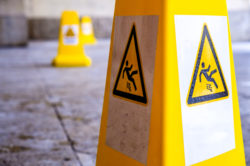Identifying the Defendants in a Slip and Fall Case
When you get injured in a slip and fall accident, one of the first questions you need answered is, “Who do I sue?” Identifying the correct defendant (or possibly defendants) in your slip and fall case is critical, as you need to sue the right party (or parties) to recover the financial compensation you deserve.
7 Potential Defendants in a Trip and Fall Case
While the answer to, “Who do I sue after a slip and fall accident?” may seem fairly straightforward, there are several possibilities—and you cannot afford to make assumptions. Depending on where you fell and why, you may have a claim against one or more of the following parties after a slip and fall accident in Florida:
1. Homeowner (or the Homeowner’s Insurance Company)
If you slipped and fell at someone else’s home, you may have a claim against the homeowner. Under Florida law, homeowners have a legal duty to ensure that their premises are reasonably safe for their guests. When homeowners breach this duty, they can be held liable for any injuries that result.
But, rather than suing the homeowner directly, you will most likely be dealing with the homeowner’s insurance company. Most homeowners have insurance, and home insurance policies generally cover homeowners’ liability in slip and fall accident cases.
2. Apartment Building Owner or Condo Association
If you slipped and fell in a common area of an apartment or condo building, then the company that owns the building or the condo association may be liable for your injuries. Apartment building owners and condo associations are generally responsible for the safety of common areas. When they fail to maintain safe common areas, they can—and should—be held accountable.
3. Commercial Property Owner
Most slip and fall accidents happen at businesses and other commercial locations. If you slipped and fell at a store, amusement park, hospital or any other type of business, the owner of the property may be fully liable for your injuries.
4. Business that Rents Its Facilities
Many businesses rent the locations of their stores, warehouses and other facilities. While in many cases property owners can be held liable for slip and fall accidents, in some cases their commercial tenants may also be liable. For example, if you slipped on a wet floor in a grocery store, the grocery store chain may be liable if it failed to promptly clean up (or place cones around) a spill.
5. Government Office or Agency
If you slipped and fell in a government building or on other public property, then a government office or agency may be liable for your accident. The government can be held liable when it is responsible for citizens’ injuries. However, special rules apply when you have a slip and fall case against the government, so it is especially important to speak with an experienced lawyer as soon as possible.
6. Construction Company or Contractor
In addition to property owners and tenants, construction companies and contractors can also be held liable for slip and fall accidents when their negligence is to blame. If you slipped and fell at a construction site, or if you slipped because of shoddy construction or negligent maintenance work, you will want to talk to a lawyer about whether a construction company or contractor should be a defendant in your case.
7. Building Material Manufacturer
Finally, building material manufacturers can also be defendants in some slip and fall accident cases. If you slipped on slick tiles or hardwood, for example, the manufacturer could be liable for your injuries. In addition to handling premises liability claims, we handle product liability claims as well, and we can fight to make sure all responsible parties are held accountable for your injuries.
Contact Us for a Free Slip and Fall Case Evaluation Today
Do you have a slip and fall case in Florida? If you think you may be entitled to financial compensation, we encourage you to contact us promptly for more information. Call 800-780-8607 or contact us online to arrange a free consultation today.
Share This



